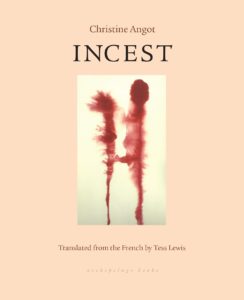“Incest” by Christine Angot [Why This Book Should Win]
Today’s second Why This Book Should Win post is from Bradley Schmidt, a translator of contemporary German literature, most recently of Philipp Winkler’s Hooligan (Arcade), who also teaches writing and translation at Leipzig University. More at bradley-schmidt.com.

Incest by Christine Angot, translated from the French by Tess Lewis (France, Archipelago)
Part of the challenge of writing this review is settling on a starting point. If this was called “Why This Book Should NOT Win” and I were a reviewer with different tastes, there would perhaps be a similar difficulty deciding what I dislike the most about the book. The lack of plot, for instance, the breaking of taboo(s), the repetitions. While Angot’s latest novel—and the first to appear in English—has predecessors and could roughly be categorized as an exceptionally difficult example of autofiction or stylized memoir, there are numerous things about Incest that make it unique. After an extended, frantic opening depicting the aftermath of a traumatic break-up with a woman named Marie-Christine, leading to an unspecified psychological breakdown around the time of Christmas, the protagonist (also named Christine) then embarks on a journey of self-discovery. She attempts to dig down and examine her life and her past. During the approximately three-month period depicted in the book, Christine is able to unearth the main source of her trauma: her father and his incestuous relationship with her as a teenager.
One could devote several extended quotes to illustrate Angot’s unique narrative style— rendered with supreme clarity by Tess Lewis—but suffice it to say, one can get the impression the book is ragged, even untidy. This is a story that has been stripped to the bone. Yet the frenetic, repetitive journey to the titular taboo and beyond simply doesn’t let you stop. The urge to keep on reading, despite it all, is not due to any overburdened salaciousness, but rather a sinking feeling of dread. This is not an easy read. Incest should win the BTBA is that it defies expectations, uniquely challenging readers with mental leaps, repetitions, associations, extrapolations, and interpretations. Once you’ve embraced Agnot’s tale, it doesn’t let you go.

Leave a Reply